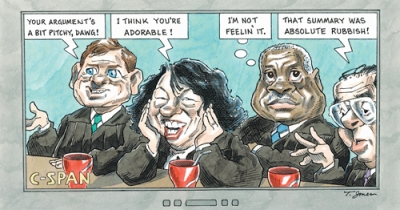- Education
- Contemporary
- Law & Policy
- Campaigns & Elections
- Civil Rights & Race
- History
- Politics, Institutions, and Public Opinion
Should Chief Justice John G. Roberts Jr. join the likes of Judge Judy on television? In a recent opinion poll, 61 percent of the respondents supported televising Supreme Court proceedings as good for democracy. The New York Times seconded that opinion, lamenting that the court, which has consistently and unanimously resisted such a move, “seems determined to keep its work out of the public’s eye.”
First, a clarification. What would be televised, were it ever to happen, would be a very small slice of the court’s proceedings: the oral argument phase. It is a serious misrepresentation to suggest that televising oral arguments is equivalent to televising the work of the Supreme Court. Indeed, there are those who maintain that oral arguments are needless, adding nothing material to the court’s deliberations and decisions.
Even if oral arguments contribute something of value, such as the opportunity for judges to interrogate the parties to the case, this is only a fraction—an unrepresentative fraction—of what the court does. Most of its work consists of selecting cases to be heard, reading briefs, deciding cases, and writing opinions—all profoundly untelegenic activities. Supreme Court justices read a lot, they think a lot, and they write a lot. This is not the stuff of The People’s Court.
Despite the closed-doors nature of the judicial activity, the final product of the Supreme Court is the most transparent of any branch of government. Remember, the Supreme Court does not just issue a verdict, as a jury does; it takes the further step of issuing an opinion. In other words, it gives a reasoned account of its decision. (Congress could never do the same for its unwieldy products.) Those opinions are made immediately available to all members of the public. Within minutes of the announcement of opinions, full texts are available on the Supreme Court’s website (www.supremecourtus.gov). Indeed, transcripts of oral arguments also are posted the same day the arguments are heard.

The court is an open book. Since its work is fundamentally textual, the only real way to access it is by joining the justices in the difficult work of legal interpretation. Not many citizens have either the taste or the capacity for this. Thus, the work of the court will remain simultaneously open to all and closed to most. It is perfectly democratic in the public nature of its opinions but irremediably elitist in that few will respond to the invitation to read.
We should respect the character of the court’s communication with the public. Much as we might hope that a different, and easier, medium might bring us closer to the court, that hope is delusive. The very nature of the Supreme Court’s enterprise is at odds with the visual and spectacular medium of television.
You might have thought print journalists would welcome a chance to argue for the superiority of the word over the image. Instead, the Times insisted that the justices ought to be YouTubed like everybody else: “Congress should pass a law requiring that the court’s proceedings be televised.” Maybe it’s true that one’s soul can be stolen (or at least corrupted) by a camera, as certain cultures believe. The soul of the court consists in its independence. The court ought to strike down any law mandating court TV as an unconstitutional assault on the independence of the judiciary.
Unmentioned in the New York Times editorial was that 56 percent of those sampled in the poll also favored restricting Supreme Court justices to an eighteen-year term. Federalist No. 78 explains the reasons for the life tenure of judges. It argues in compelling detail that their special term of office—which might seem to violate the democratic principle of rotation in office—is essential to guaranteeing an independent judiciary and sustaining the separation of powers. It is “the best expedient which can be devised in any government, to secure a steady, upright, and impartial administration of the laws.”
Before recommending drastic departures from the constitutional order (and a change in the term of office would be more radical than the presence of cameras), citizens ought to understand the original republican justification for the Constitution’s provisions. Media elites could help by making good on their ostensible purpose of informing public opinion rather than flattering it.







